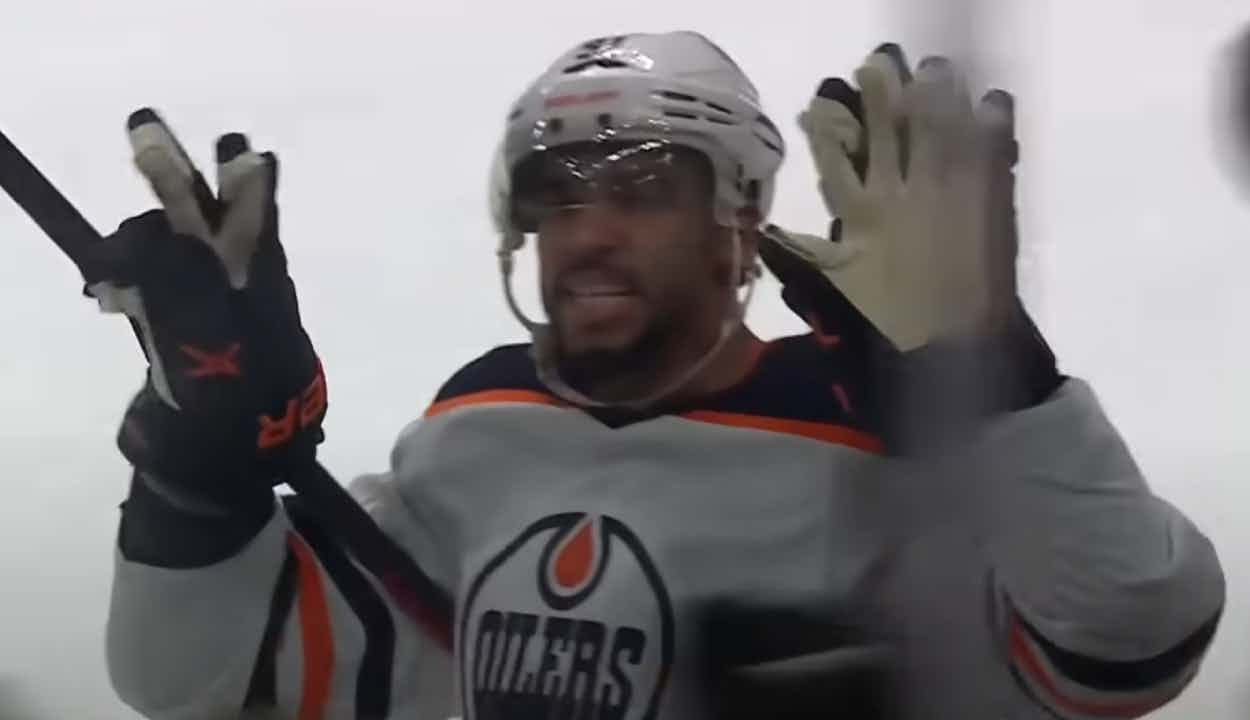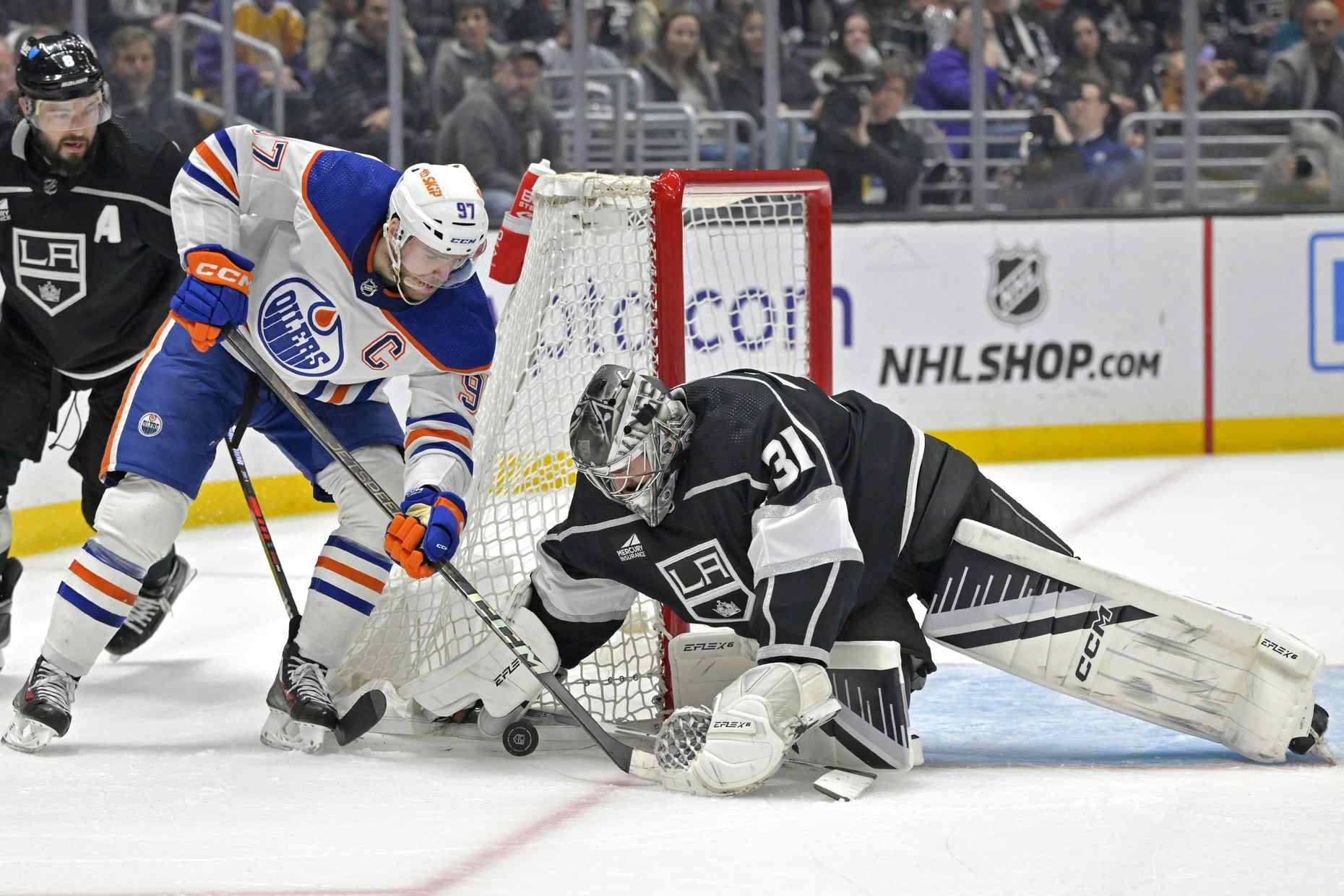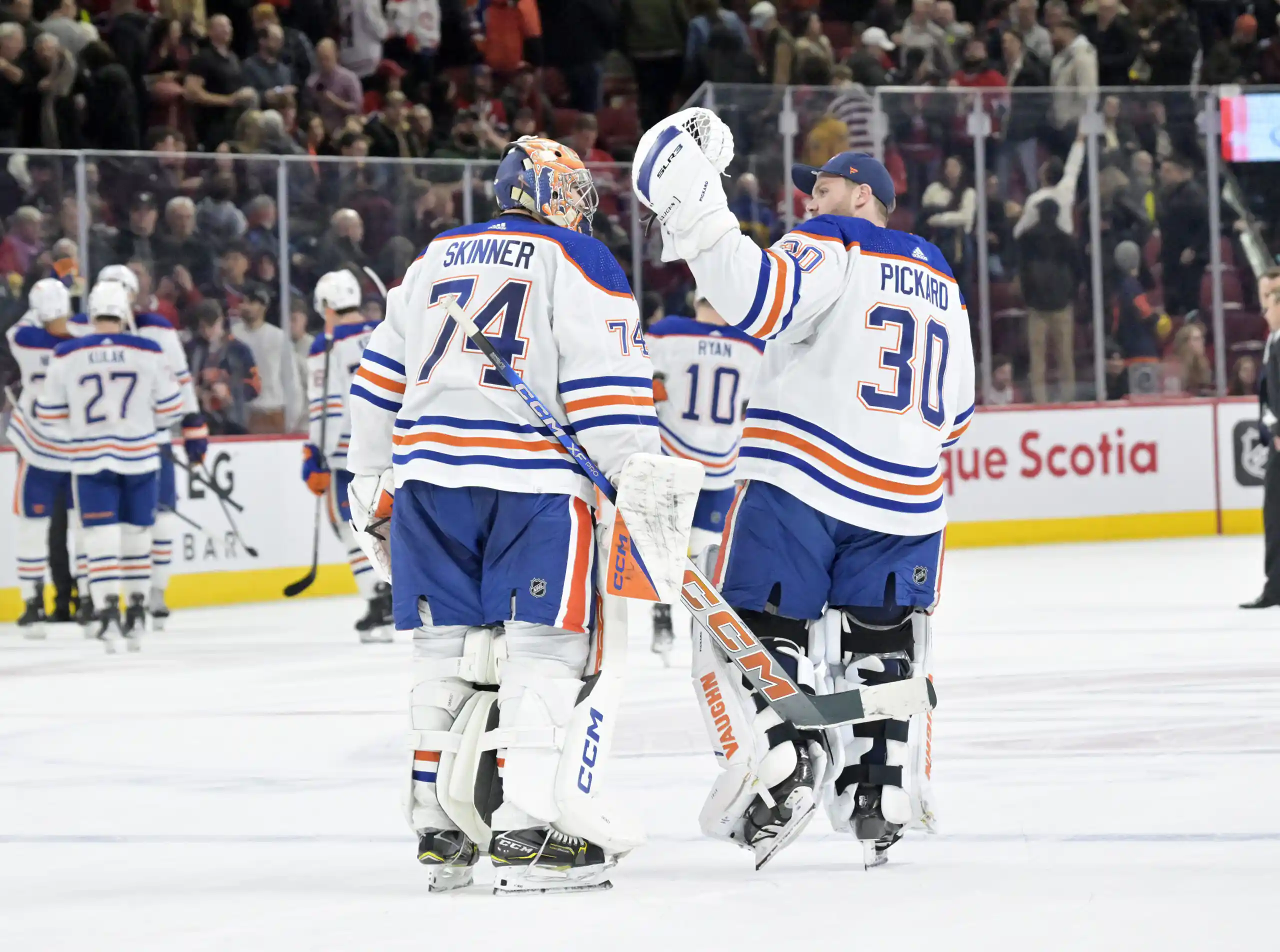Woodcroft discusses his first Head Coaching job

By Jason Gregor
5 years agoJay Woodcroft was an offensive centre in college. In four years at the University of Alabama-Huntsville, he scored 50-73-123 in 113 games. He then spent six seasons chasing his NHL dream in minor pro leagues like the ECHL, CHL, UHL and WCHL. He finished his playing days with the Stuggart Wizards in the German Oberliga league, division two.
The next year, 2005/2006, through his hockey connections, he was hired by the Detroit Red Wings as a video coach. He spent three seasons with the Red Wings and was part of their 2008 Stanley Cup winning coaching staff. Todd Mclellan was an assistant coach in Detroit, and after winning the Cup he was hired by the San Jose Sharks. Woodcroft left with McLellan, and became his assistant coach.
They spent the next ten seasons together — seven with the Sharks, and the past three years with the Edmonton Oilers.
But last week Woodcroft decided it was time to move on and become a head coach.
Woodcroft joined Jason Strudwick and me on my radio show last week to discuss his decision to become the head coach of the Bakersfield Condors in the American Hockey League. Woodcroft will remain in the Oilers organization, but he’ll be the main man on the bench for the first time in his career.
I view the head coaching job in Bakersfield as one of the most important jobs in the Oilers organization right now. For the first time in what feels like forever, the Oilers look like they will finally have a steady crop of prospects with actual NHL potential. Ethan Bear, Caleb Jones, Tyler Benson, Filip Berglund, Aapeli Rasanen, Graham McPhee, Kailer Yamamoto, Dmitri Samorukov, Ostap Safin, Kirill Maksimov and Stuart Skinner will be in Bakersfield this year or next season, and their development will be crucial if the Oilers want to become a consistent playoff contender.
Not only will the Oilers have to play these young players, they will need to develop them properly, and the head coach in Bakersfield should play a big role in helping them reach their potential.
We discussed player development, becoming a head coach and powerplay failure with Woodcroft.
Jason Gregor: Why was now the right time for you to become a head coach for the first time?
Jay Woodcroft: This is something that I’ve always had in the back of my mind as I began my coaching career in Detroit. I’d like to say that I sharpened my tools, my coaching tools, so to speak, in the last while in the three different organizations and I’m very excited about this opportunity.
When it was presented to me by Peter it made me think long and hard about where I wanted to go in my personal career as a head coach. And that, coupled with the fact there are so many good things happening within the organization, so many good players coming to the Edmonton Oilers organization, that the time seemed right for myself and for my family.
Jason Strudwick: Looking at this transition from assistant coach to head coach, is there an area that really excites you as far as moving away from assistant coach to head coach?
Woodcroft: For me I think when I look at that, I think I have to be myself in the position of being a head coach, and work towards my strengths, which first and foremost is a work ethic that was instilled by my parents. I’ve learned good coaches establish the facts, they’re not going to be outworked, that they are going to be the example for their team.
So I’m excited about being that type of example. I’m excited about bringing my experience of working over a thousand games in the league, with some of the best players to have ever played in all three different organizations, and that will lead to a simplified approach in confidence and I’m a big guy on details.
I’m a very detailed-oriented person. I think details count, especially for young pros and it’s my job, and it will be the job of the coaching staff in Bakersfield, to make sure we are giving these young players every tool they need to be successful so that they become successful Edmonton Oilers. And not for short periods of time. We want them to be Edmonton Oilers for a long period of time and that will be our job to prepare them for that.
Strudwick: You’ve been an assistant coach for many years and you’ve seen many players called up from the AHL to the NHL. Is there a gap in there or something you’re going to dial in on to help those guys be more prepared for the NHL, but also maybe more caught up with the skills required to become regular NHL contributing players for the Edmonton Oilers?
Woodcroft: Well I think every player represents a different set of issues in their own personal game. One player, it might be their skating. One player, it might have something to do with how they are reading certain situations. One player might have to carve out a niche or a role in the National Hockey League and it might be different from what they are being asked to do in the American Hockey League.
The thing I have learned over my time is all of the players I’ve dealt with are unique, they are all individuals, and they all have to be coached differently. I don’t think that it is anything about being a head coach or development. It’s formulaic. I think the art of being a good communicator and a good coach is to figure out how you can get to these guys on an individual basis, how you can give them the tools that they’re going to need, whatever that is, depending on their strengths and their weaknesses, and help them moving forward. That is our job, to identify those things and work with them on an individual case-by-case basis.
Gregor: You’ve been an assistant coach for a long time and often that means you are the go between the players and the head coach. At times maybe more of a pat on the back guy than a disciplinarian. As a head coach your role changes. Bill Peters told us last week there is definitely a different personality needed from an assistant coach to being a head coach. What have you learned from watching the head coaches you worked with, and will you alter your approach as you take on the head coach role?
Woodcroft: Well, Jason, I actually as a young coach, drew inspiration from an NBA basketball coach who had a similar come up to myself named Erik Spoelstra, and I created a relationship with him. Of course, he’s the head coach of the Miami Heat. I created some correspondence with him. He gave me some great advice one time, he said ‘make sure I was the assistant coach I would want to have when I became a head coach.’ And that was something that I kind of lived my assistance coaching career by.
As you said, it’s a much different animal when you make the step to becoming your own head coach and you mentioned that I had a pretty good teacher over the last ten years working closely with Todd and three before that working with Mike in Detroit. I’ve had some good lessons learned, I’ve been able to see how they responded to different situations. Obviously, being the person with the final say is an important responsibility and one that I don’t take lightly. In fact, I take it very seriously. I think there will be added responsibilities when it comes to dealing with management, dealing with media, and different pressure in games.
As an assistant coach, part of the responsibilities on the bench was to be alert and to be aware of what was happening on the ice, but to understand what matchups were coming, that type of thing. In my opinion, head coaches are responsible for the entire overview of the game, making sure the right players are on the ice at the right time and it’s definitely going to be a challenge, and I will lean on the experiences I’ve learned from watching Todd and Mike.

Apr 16, 2017; San Jose, CA, USA; Edmonton Oilers head coach Todd McLellan watches the game against the San Jose Sharks in the second period of game three in the first round of the 2017 Stanley Cup Playoffs at SAP Center at San Jose. Mandatory Credit: John Hefti-USA TODAY Sports
Gregor: Further to what Spoelstra said about being the assistant coach you would want to hire when you are the head coach, what type of an assistant coach are you going to be looking for to fill out your squad in Bakersfield?
Woodcroft: Well I think we’re really in the preliminary stages on that. This is all very new, it all kind of came together at the end of last week. I’ve been travelling. I actually attended a coach’s conference over the last few days. We’re going to take our time, we’re going to go through the process of determining almost the what before the who and come up with a list of criteria in terms of the ideal qualities for our assistant coaches and how to build the right staff.
I know that this being my first opportunity to become a head coach I just want to make sure that I do it right. I want to make sure that I talk to lots of different people, and they are going to come at things from a wide variety of experiences and perspectives. I think that when you take the proper steps and take your time and do it properly it becomes clear.
Strudwick: When you kind of piece in your staff together, does it get affected by knowing the type of players who are going to be joining the organization? I look at some of the guys who are turning twenty this year. Do you think, ‘oh man I could really use someone to work with this guy,’ or is it a general approach to the club?
Woodcroft: Well, I think that the realities are that there already is a young influx of players who are coming into the organization. Some came in last year on the back end. This year’s crop seems to be young and skilled up front and I think for sure that’s something you keep in mind. You think about how we’re going to develop this type of young skill, how we’re going to put them into positions to succeed and what tools we’re going to give them. And one of the best things that we can do is make sure we build the right staff that is going to maximize the potential, not only of the group, but of each player individually.
Gregor: As a coach who of course oversaw the power play, it was a real struggle this past year for the Edmonton Oilers, and it was one of the big frustrations especially after finishing fifth the year before. When you look back and watch the film all throughout the season, what went wrong on the power play? Why was it never able, well I shouldn’t say never because it was good for the first twenty games, twenty one percent, but then it was only eleven percent for the final sixty games. What changed?
Woodcroft: Well that’s another good question. I think first and foremost I learned this from Todd’s leadership is that you should begin by looking at me. And as the caretaker of that power play that was my starting point in the mornings, it was something that actually went through a bunch of different stages on. You tried to find the answers. We worked hard and tried to find the right combinations of players. We actually had a lot of different metrics appear above the midpoint of the league.
So the conversion rate was a real disappointment for us. This past year we look at where we were in zone entries which was at that top of the league, we looked at zone time, we looked at chances for power play, shots on power play, all of those types of metrics, but we kept coming back to the disappointment of the conversions. There are some ideas that have been batted about internally and in terms of me and the need for improvement I’ll let Todd and the NHL coaching staff talk on that, but rest assured it was something that we talked a lot about over the year with careful study based on lots of film work as you mentioned, and based on past experiences of how to try to solve problems. At the end of the day, it wasn’t good enough and as I said I was the caretaker so the starting point should be looking at me.
Gregor: Looking at last year when it was really successful, it got a lot of success running [Leon] Draisaitl out of the bumper position. And this year you went away from that. Was that because teams were taking it away? Draisaitl barely had any PP points early in the year, so did teams defend him differently on the power play this year than they had previously?
Woodcroft: Yeah, I think that is fair. I think anytime you have this strength the opponent tries to find ways to nullify that strength. Leon was towards the top of our team on power play goals along with [Mark] Letestu and [Milan] Lucic and early the opponents tried to force us to find other ways to beat them. And then through Leon and because of that we were forced to try and find new ways to get him the puck. At the end of the day, he led our team in power play goals this year, so as the season progressed he worked his way out of that early power play goal slump or point slump that he was in. As we talked about earlier, this was not something that anybody on our team was happy about. It’s a real focal point for improvement for the team going forward as well as our penalty kill. It’s something that I know there will be careful thought, study and practice on moving forward.
Strudwick: I’m wondering what the approach might be as far as working with Todd. Will there be some similarities as how to play on the forecheck, as well as the system or style on the power play and penalty kill?
Woodcroft: Yeah, I think as we sit down, and I’m sure both staffs will get together before training camp, we’ll iron out a way of doing things, a way that we want the organization to play. I’m very fortunate that I’m taking a position as the head coach in the American League and I’m very much aligned with the belief system of the NHL head coach. I understand the way he thinks, I understand his tactics, and I understand his language. I think that kind of continuity of the message up and down through the organization is a real positive thing for our young prospects to have in Bakersfield, because when the call does come, when a young player is brought up the NHL team in Edmonton, they will have an exact, a clear, a concise picture of exactly the way things are run at that level. I think that kind of synchronicity is a positive for everybody.
WRAP UP

I’m curious to see how Woodcroft handles his first head coaching job. There is much more responsibility and pressure on him, but obviously, he feels now was the right time to make the move. No team would have hired him as an NHL head coach without having some head coaching experience elsewhere. You need to show teams you can run a bench. As he alluded to above, the head coach has to be involved in everything during the game.
According to many players I spoke to, they feel Woodcroft’s best asset was how he communicated. He was good at making them understand his point. That will be crucial in the development of the Oilers young prospects. The Oilers desperately need some of their later round draft picks to become NHL players in the future, and they’ve given Woodcroft the responsibility of overseeing it.
This is a great opportunity for Woodcroft, but it is also one which comes at an incredibly crucial time period for the entire organization. He is a rookie head coach and he will have to prove he was the correct choice. I understand those who question if a rookie head coach, at any pro level, is the right choice with so many young players. It is a fair question, and we won’t know the answer until we see him on the job.
The Oilers are hoping Woodcroft and their young players will develop into NHL prospects.
Recently by Jason Gregor:
Recent articles from Jason Gregor





